This post may contain affiliate links. If you make a purchase through a link, I may receive a small commission, at no cost to you. These commissions help keep this website up and running, and I thank you for your support. Read my full disclosure here.
Whilst we were staying in the Bulgarian coastal city of Burgas we decided to take a day trip to the ancient UNESCO city of Nessebar, often referred to as the ‘Pearl of the Black Sea’. It was originally a Thracian settlement, known as Menebria, the town became a Greek colony at the beginning of the 6th century BC. (You can also see a large excavated Thracian settlement in Sofia). From the 5th century AD it became a Roman stronghold then eventually part of the Ottoman Empire.
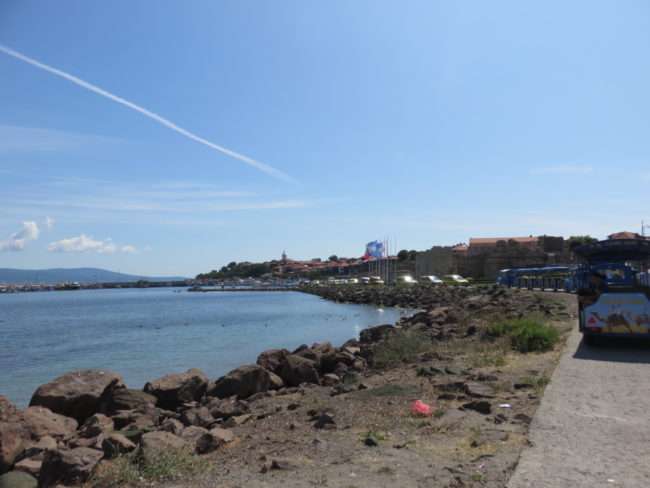
How to Get to Nessebar from Burgas and Sunny Beach
The Black Sea coast is a popular tourist attraction, so there are regular buses that run between Burgas and Sunny Beach with a stop at Nessebar on the way. The buses leave from the bus bays that are behind the Burgas bus station building. There are electronic signage above the parking bays and the buses also display a sign in their front window. The bus drivers are used to tourists, so if you are not sure where the bus is going, then just ask them. Some of the buses are rather old, but they did have air conditioning. Alongside the driver there is also a person that sells the tickets, so just get on the bus and find your seat and they will come to you. You will need cash to buy your ticket. The bus stops in the new part of Nessebar and it is a 10 minute walk down the road into the old town.
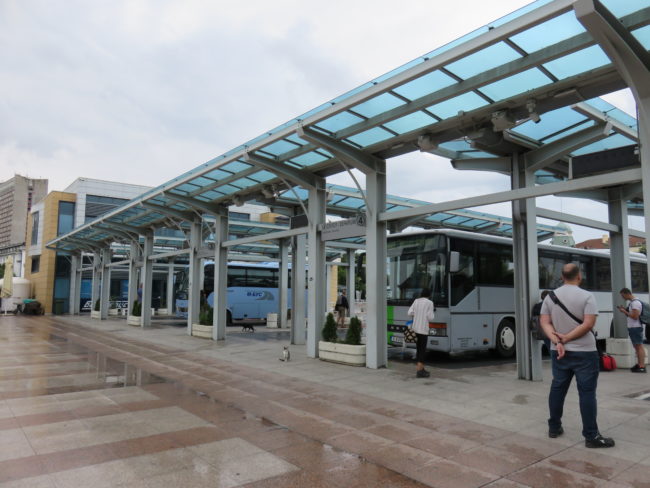
Exploring Old Town Nessebar
We visited Nessebar in summer and it was bustling with tourists, but if you plan to visit here in winter be aware that it becomes very quiet and many of the restaurants and shops close. There are plenty of historic sites to enjoy including fortress ruins and lots of churches – it has the highest number of churches per capita in Bulgaria! Nessebar is also a good place to visit if you are looking to buy some souvenirs for friends and family. Sure, there is the usual tourist tat, but there is also some nice traditional items to be found at reasonable prices.
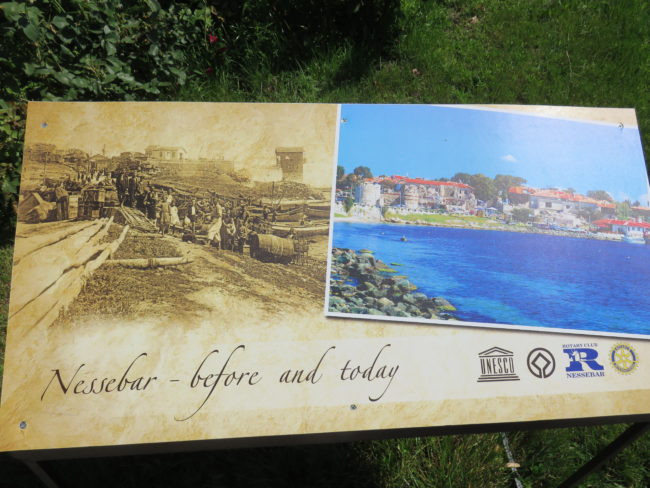
We arrived by bus in the new part of Nessebar and headed down the road to the old town which is connected by a narrow strip of land with a road and path that runs alongside it. As we walked towards the old town there were information boards dotted along the way that displayed old photos of how Nessebar once looked many years ago. It certainly has changed a lot, however, it has still managed to retain its historic feel, and once you step through the fortress gates it really is like stepping back in time.
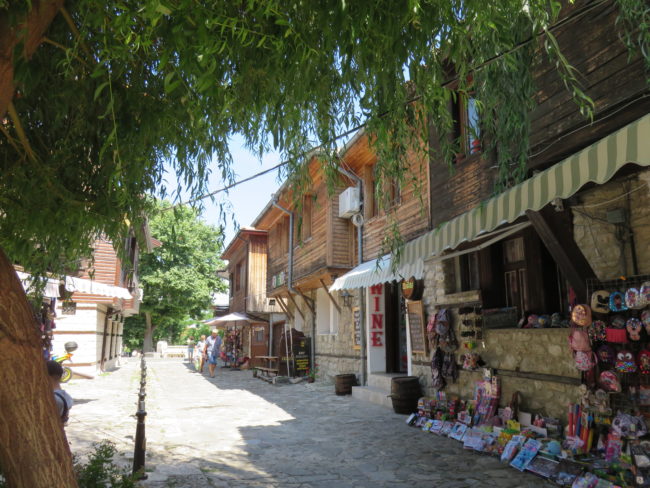
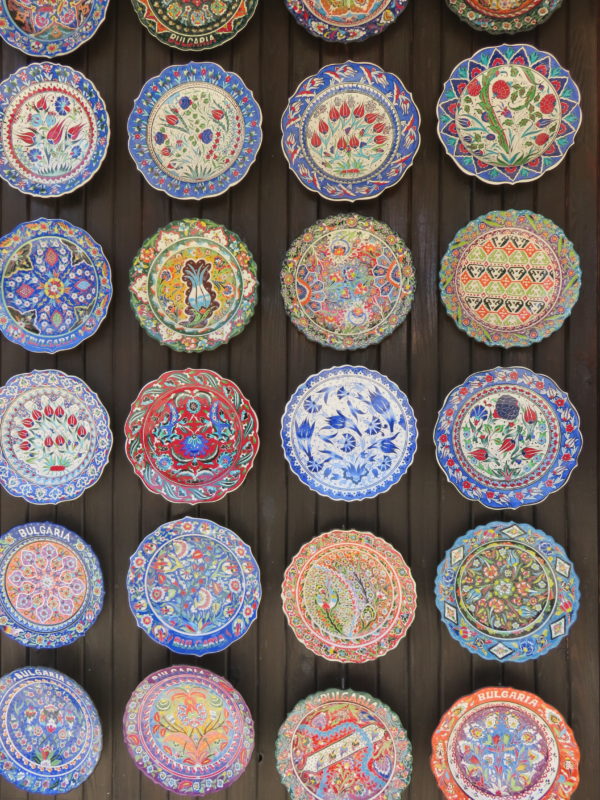
Entry Fees
Entry fees apply for the sites listed below. If you are planning on visiting several places, then save money with a combined ticket. You can purchase tickets at the Archaeological Museum on your right as you enter through the old town gates.
- Archaeological museum
- St. Stephen Church
- St. Spas Church
- Christ Pantokrator Church
- St. Paraskeva Church
- St. John the baptist Church
- St. Todor Church
- Ethnographic Museum
Wooden Windmill
The old wooden windmill is the first site the welcomes you as you walk from the new town to the old. It was built during Nessebar’s Renaissance period.
[icon name=”lightbulb-o” class=”” unprefixed_class=””] Tip
- Take a photo in the afternoon for better lighting.
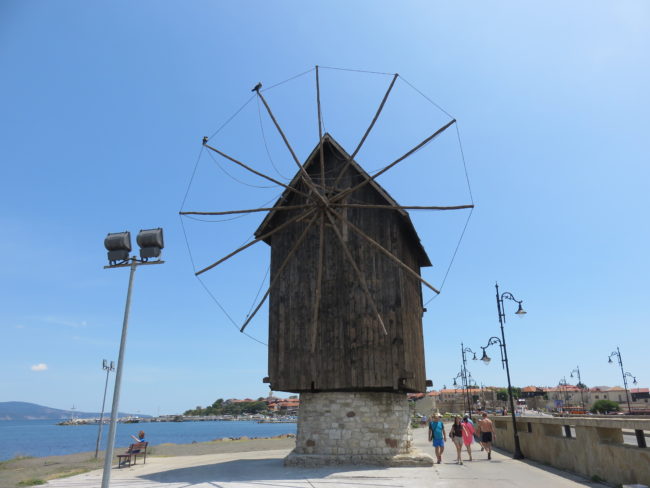
Statue of St Nicholas
Across from the wooden windmill stands the statue of St. Nicholas overlooking the harbour of South Nessebar Bay. St. Nicholas is the patron saint of sailors and artist and creator Stavri Kalinov sculpted him posed holding a dove, looking for new land.
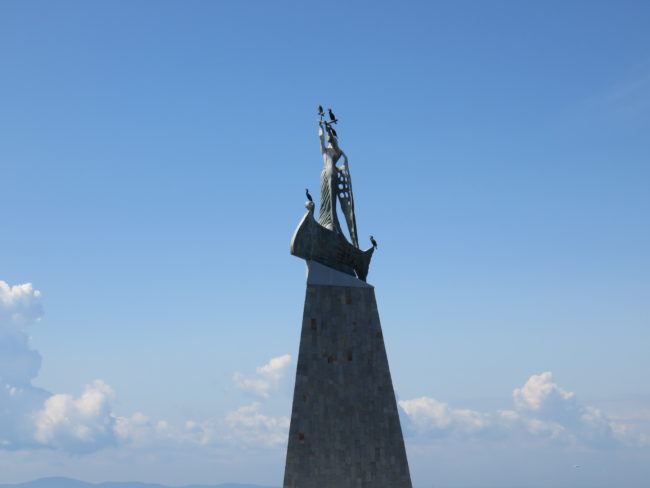
Nessebar Fortress
As you walk up the path that leads you into the centre of Nessebar you are welcomed by an impressive fortress. The crumbling walls date back to the Medieval times and Byzantine era and makes for a very grand entrance. On the right as you enter is an Archaeological Museum which tells you more about the history of this ancient city.
Be prepared to be harassed by people trying to sell you bracelets. We travelled a fair bit around Bulgaria and this was the only place with persistent hawkers. It can make it difficult to get a nice photo because they seem to hover in your shadow despite politely and firmly declining to make a purchase.
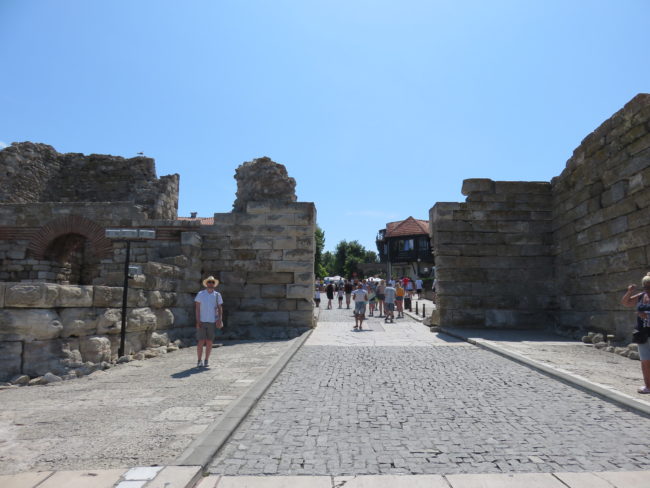
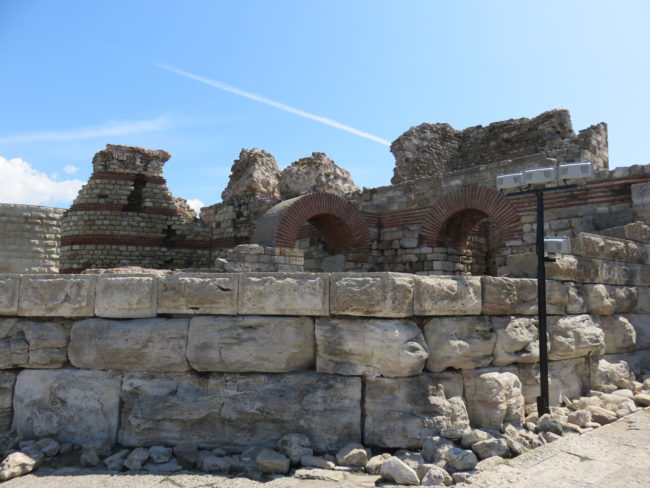
St. Stephan
As we walked up ul. Mena we came to St Stephan, a former Orthodox church. It dates back to the 11th century and over the years it has had parts added on to it. Inside, the walls are painted with historic icons and frescoes.
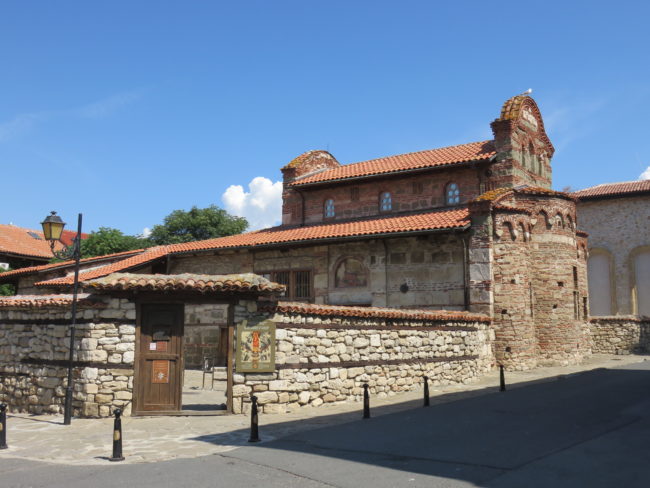
Church of St John Aliturgetos
The 14th century Church of St John Aliturgetos was never actually consecrated (declared sacred) which is the reason why it has ‘aliturgetos’ at the end of its title as this is Greek for ‘not consecrated’. Apparently, during construction, a builder fell and died and so the church would not allow it to be a place of worship. Sadly, the church was badly damaged during the 1913 earthquake. The views from its raised ledge over the water are stunning.
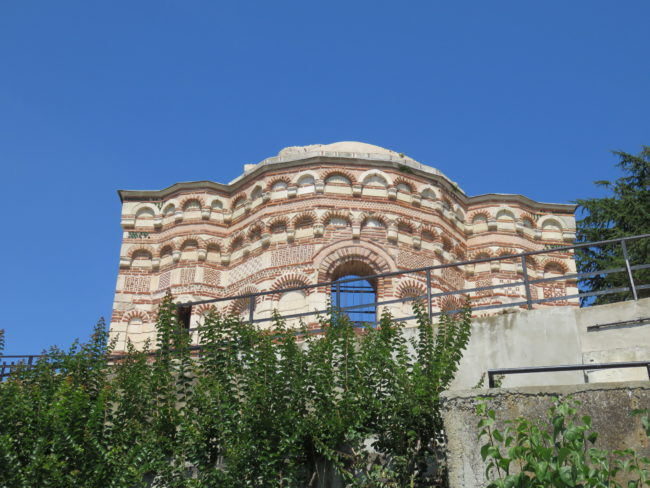
Ancient Greek Amphitheatre
On the other side of Church of St John Aliturgetos is a small restored Greek Amphitheatre. Apparently, they hold small performances here over summer, however, there wasn’t anything on when we visited.
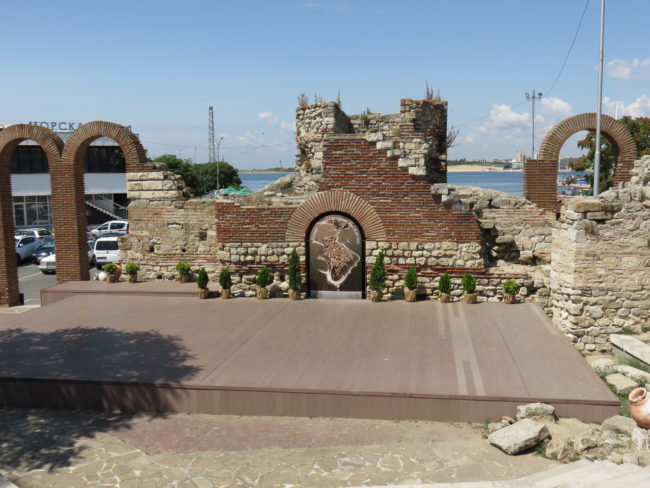
19th Century Wood and Stone Buildings
The buildings in Nessebar are made in the traditional style with a stone first floor and wooden upper floors. This, along with the cobbled streets, creates a feeling of stepping back in time. This old town has been turned into a tourist location, so these buildings are shops selling a range of traditional items, including lace, pottery, and art. It’s like a maze of buildings in this little town so we just allowed ourselves to wander around and explore.
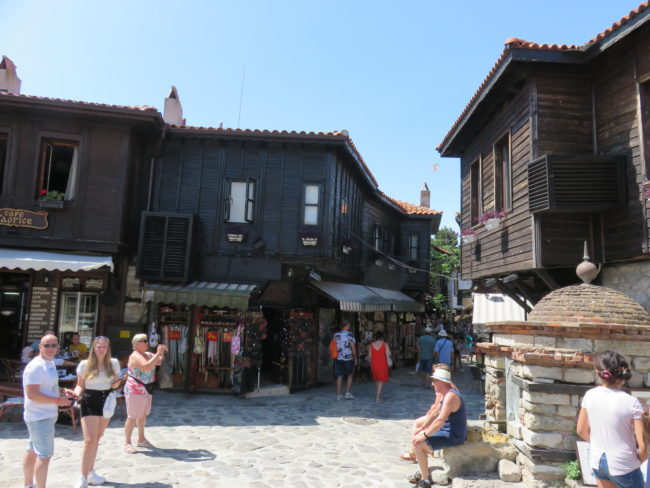
The Old Fountain
During summer in Bulgaria it gets very hot and I love how the towns and cities have ancient drinking fountains you can refill your reusable bottle at. I wish we had more of these in the world so we could all stop buying bottles of water.
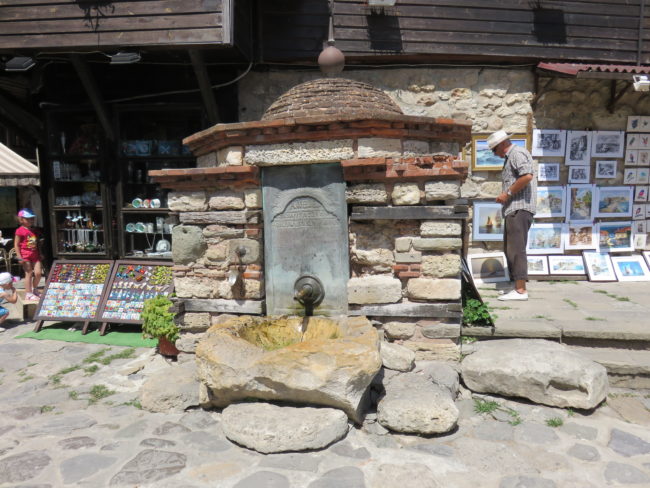
Church of Saint Sophia
We stopped and enjoyed a coffee break at a cafe with views of the Church of Saint Sophia. Now in ruins, this large church sits in what was once the heart of the ancient city. It was built in the late 5th and early 6th century, but much of what you see now was built in the 9th century.
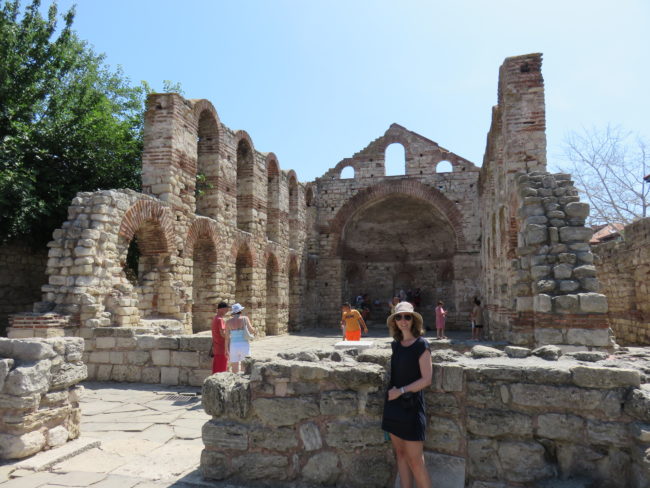
Basilica of the Holy Mother of God Eleusa
The Basilica of the Holy Mother of God Eleusa was built in the 6th century and was part of a monastery complex. Sadly, it was destroyed by an earthquake, so only its ruins remain.
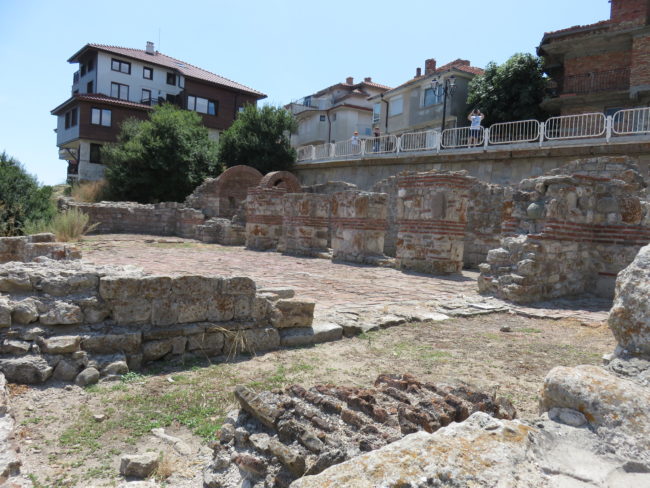
Church Dormition of Theotokos, Church of St Theodore, Church of Christ Pantocrator, Church of Saint John the Baptist
Beaches
Nessebar has a lovely coastline, but there is not much beach space. There is a small harbour with some fishing boats on the north side, and on the south side there are small stony beaches with a bit of seaweed, but I think it’s still a nice area to swim. There is little sandy beach called Bunata Beach. It is a nice spot, however, the best part you have to pay to use and the free part gets mostly covered when the tide is in. If you are looking for a larger beach, then the popular busy touristy Sunny Beach is nearby. You can get there by taking one of the regular buses that run between Nessebar and Sunny Beach, but you can also walk there, it takes about an hour.
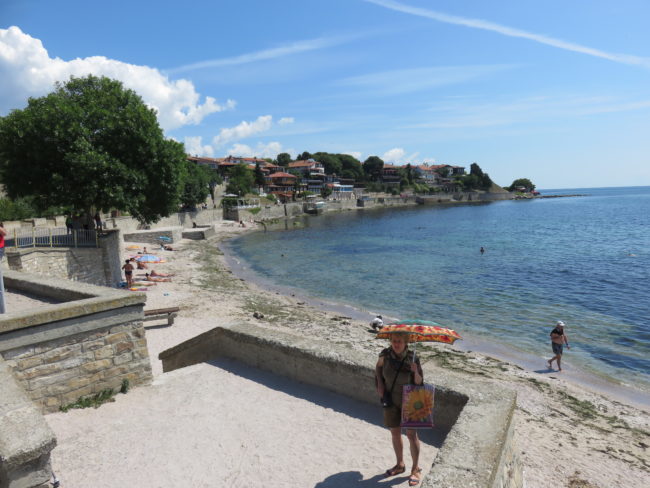
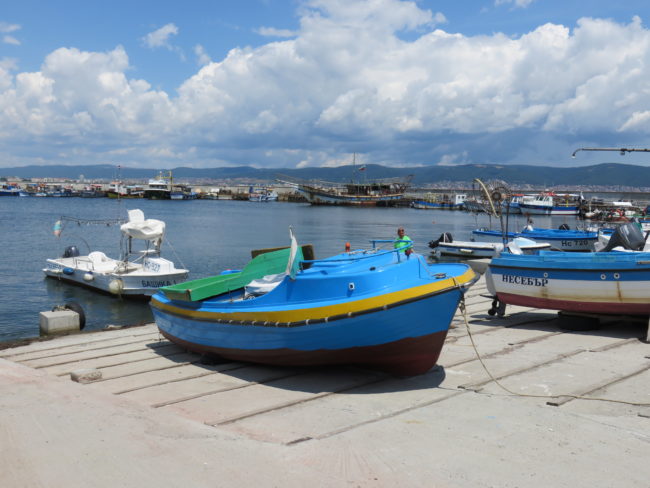
Practical Tips for Visiting Nessebar
- How long should I visit Nessebar for? We visited Nessebar on a day trip from Burgas. However, I think this would be a lovely spot to stay for a night or two.
- Getting to and from Burgas to Nessebar: Read my section above about how to get the bus from Burgas.
- Tours of Nessebar: A guided tour is a great way to find out more about this ancient city. If you are on a budget then there is a free Nessebar Tour and for a small price, you can get an audio guided tour and go at your own pace. Otherwise, you can pay to go on a Nessebar walking tour.
- Language: Bulgarian. It can be difficult to understand signs when they are in Bulgarian, as it looks nothing like the English version. Many of the areas we visited in Bulgaria only limited people spoke English, so we tried to make an effort with some Bulgarian. I encourage you to try a little Bulgarian too. Fun fact – Bulgarians nod when they say no and shake their head when they mean yes.
- Yes = да (da)
- No = не (ne)
- Please = моля (molya)
- Thank you = благодаря (blagodarya)
- Hello = добър ден (dobar den)
- Where is the toilet? къде в тоалетната (kade e toaletnata)
- Currency: Bulgarian Lev, or Leva, which is the plural. Most places had card machines and there were plenty of ATM’s. However, you will need small change for the buses.
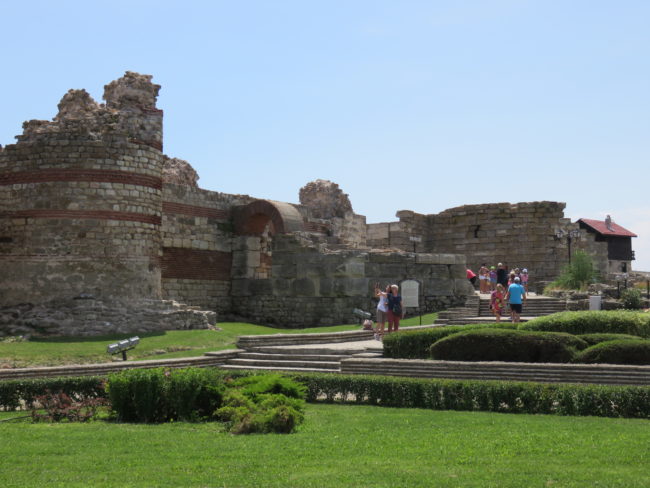
-
- Electricity: The electrical current is 220-240 volts, 50-60 Hz. Wall outlets take the European two round prong plugs. However, you are better off purchasing a worldwide adaptor that can be used in Bulgaria as well as other countries. At least then you can potentially get some further use out of it on future vacations. If you’re taking several electronics with you, then I would recommend purchasing a couple of these adaptors.
- Driving: In Bulgaria, they drive on the right hand side of the road with speed signs in kilometres per hour (km). The speed limits are 50 km (31 mph) within towns; 90 km (56 mph) outside towns; 120 km (75 mph) on expressways; and a rather scary 140 km (87 mph) on motorways. Some of the roads we drove on were very old with huge potholes, and the paint had long since faded, so we had to drive slower in these areas.
- Navigating: We used Google’s free Offline Maps. Google Offline Maps allows you to access free maps for navigating that can be used offline i.e. you don’t need WIFI, data, or roaming to be able to use them. Follow this detailed guide on how to use Google’s Offline Maps. Using your phone as a GPS will drain your battery quickly, so use a portable battery charger, which you can use to charge your phone and any other USB chargeable devices. If you prefer a paper map, then purchase a Bulgarian road map before you go. At least it’s reliable and won’t run out of battery or malfunction like the electronic options!

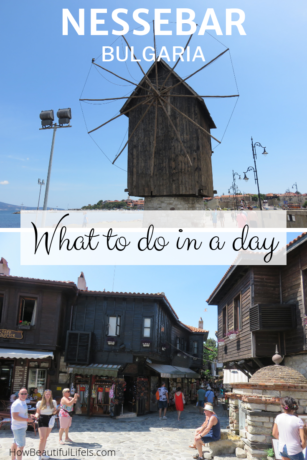
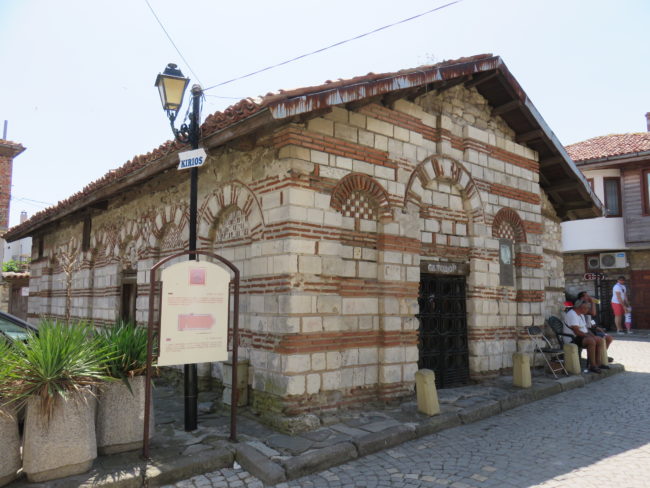
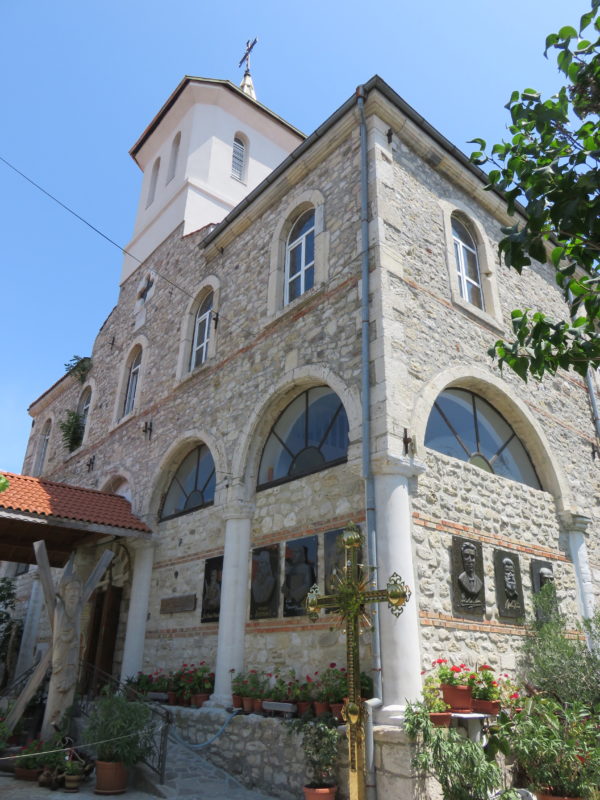
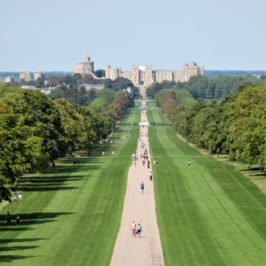


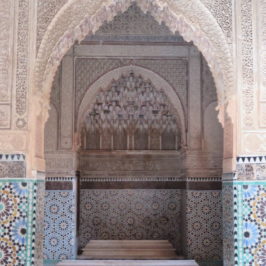
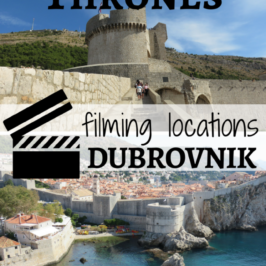
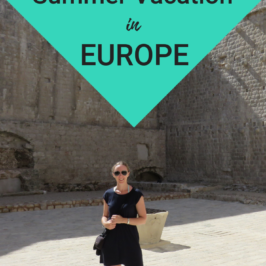
Leave a Reply